COVID-19 is affecting many industries, including design. Because of social distancing rules, many companies have made the move to working with distributed teams, where remote management becomes essential.
Establishing effective communication and collaboration processes are some of the most challenging parts of remote work. With traditional in-person work, people can see each other face to face. As a result, communication is fast and easy. Remote communication doesn’t automatically create this feeling of shared context, and it can be hard to maintain open and quick communication.
In this article, we’ll discuss practical recommendations for design team managers. You’ll learn how to collaborate effectively if your team is remote. By establishing solid routines and processes, and by employing digital collaboration and communication tools following our three key strategies, you can mitigate the difficulties of remote work while helping your team produce exceptional results.
Table of contents
Key Strategy #1: Plan and maintain project transparency
People often underestimate the amount of planning that is required for effective remote management, which leads to delayed launches, confusion, and frustration. Here are some tips for making sure your project runs smoothly.
Manage the product backlog
One of the first decisions a project manager should make is to put all of the team’s tasks into project management software.
If the task is not in that software, it does not exist.
When it comes to project planning, my key recommendation is to use ‘chunking’—break down large tasks, like requests to implement specific features (which designers and developers call ‘user stories’) for example, into smaller tasks. Then, prioritize them and set a deadline for each one.
By doing that, you break down your whole product design journey into a number of steps that you can evaluate and measure, instead of having one, large, intimidating task. This also makes it easier for the human brain to process the information without becoming overloaded, which can lead to procrastination on the larger task.
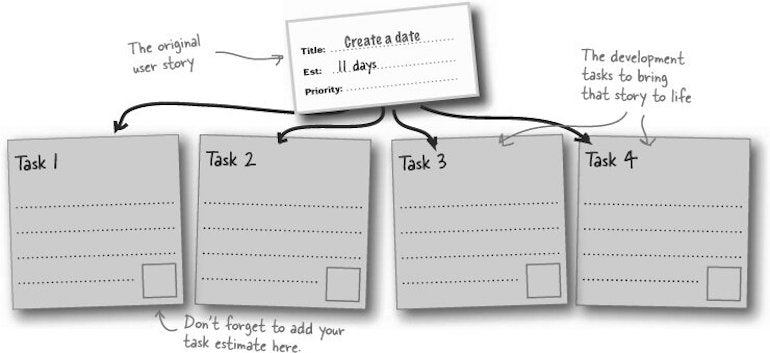
Create a clear roadmap
Product teams produce excellent work when every team member knows what they are supposed to do and by when. This is the key to remote management. So, it’s essential that the product roadmap is crystal clear to everyone, and team members should understand each other’s roles and responsibilities.
"Product teams produce excellent work when every team member knows what they are supposed to do and by when. This is the key to remote management."
I recommend using a Gantt chart to keep everyone on the same page. Gantt charts make it easier for team members to see and understand priorities and dependencies, which can help identify roadblocks and move projects forward.
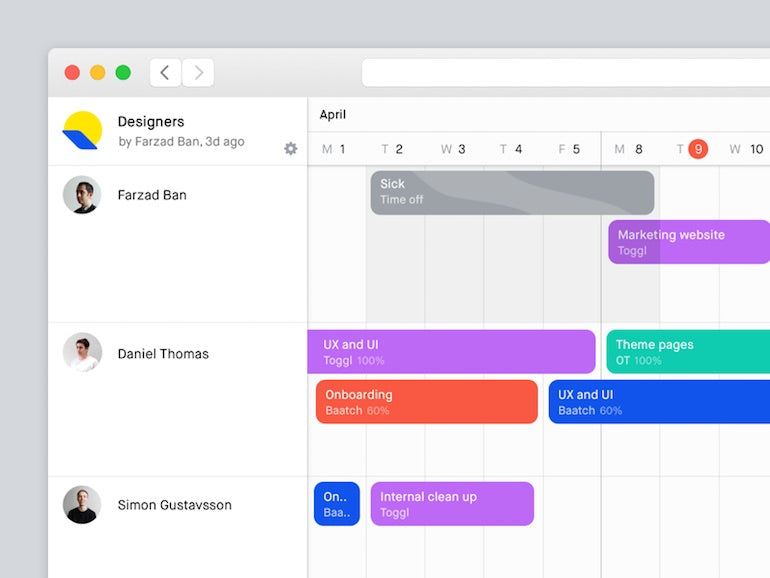
Use an open calendar
All events, such as meetings or design reviews, must be outlined in your team’s calendar. Just like tasks within your task management software, if an event is not in the calendar, it does not exist.
Make sure to schedule meetings and plan what will be discussed in advance. As we mentioned in our full guide on how to work remotely, each meeting should have:
- A designated leader who owns the meeting and carries it forward, which is essential during remote calls with a larger number of participants where cross-talk can derail focus
- An agenda of what will be discussed, which should also be used to log decisions made in the meeting
- A specific time limit so you are forced to stay focused and on track during your conversation
You might also like: How to Build Strong Relationships with Clients in Another Time Zone.
Conduct milestone reviews
Milestones are significant events that occur during the product design process. A milestone can be the completion of a particular feature or visual design phase, for example. Milestone reviews are less about individual design decisions, and more about product strategy and collaborative work.
In order to have excellent remote collaboration and work together efficiently, it’s essential to have regular milestone reviews with your entire team to illustrate how your design is evolving, and to make sure each member feels valuable to the team.
The more traditional office environment team rituals you can translate into the remote world, the better.
Key Strategy #2: Establish effective communication processes
Clear communication plays an essential role in the design process, but it’s even more important when team members work remotely. Remote teams often struggle with miscommunication because team members are more prone to working in silos. That’s why the success of a product designer depends on how well they can communicate design decisions to other people involved in the process.
"Clear communication plays an essential role in the design process, but it’s even more important when team members work remotely."
Strive to over-communicate
When beginning a new project, it often takes a while to figure out how much communication is “just right.” But one thing is for sure—it’s always better to over-communicate than not communicate enough when it comes to remote collaboration. It will help you avoid misunderstandings and missed cues.
Here are a few rules a project manager needs to follow to ensure that team members have all the essential information they need to do their work:
- Communicate often throughout the day. It's important to establish regular rituals for the whole team to share updates, such as daily syncs. Those syncs are an opportunity to discuss blockers to progress, figure out solutions, and remain aligned on the team’s priorities.
- Schedule design reviews. One of the most difficult parts of remote design work is being unable to talk through your design solutions. Design reviews (or design critiques) are an important part of the design process. Hold regular design reviews to make sure you’re moving in the right direction together.
- Have regular 1:1 meetings. Video chats are a good way to maintain regular contact with your teammates. You will gain insight into what everyone is working on and how they’re progressing. For each 1:1, have a document where both participants can write down questions, concerns, and general notes.

Make rules for using communication channels
Different types of messages require different channels. It should be clear to your teammates which cases should be communicated through chat, when they should write emails, and when they should make a video call.
Introduce some common rules for using communication channels so everyone knows what to use and when.
Conduct design review sessions
As mentioned above, design reviews play a key role in the design process. Design reviews provide regular touchpoints where team members meet to discuss the design and share best practices and learnings. The Figma team shared a helpful memo for design teams on running a design review session. Remote teams can use online workshops, pair design, and silent critique sessions as shown below:
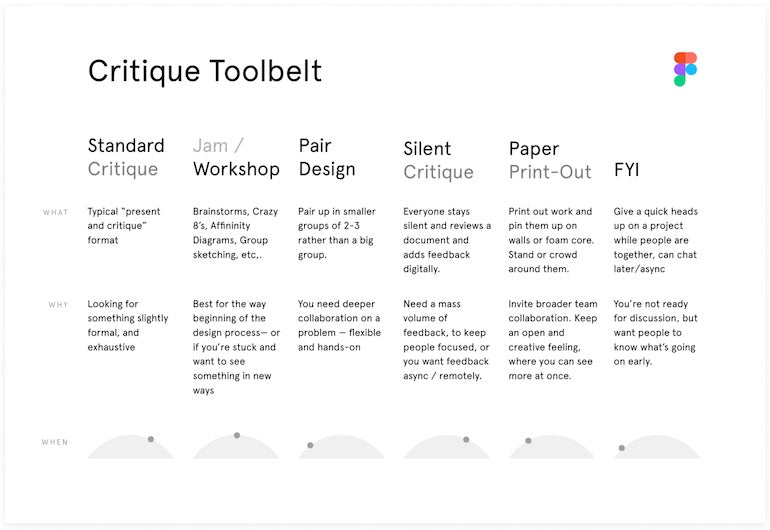
Here are a few recommendations to make the most of your review sessions:
- The whole product team, not only designers, should be present and actively participating during a review session. Team members from different disciplines will have diverse perspectives on design, and this can be beneficial to the user experience.
- Establish feedback boundaries. Know what sort of feedback you want to get. Are you looking for insights on visual design decisions, or do you want to focus more on information architecture? This knowledge will help you to formulate questions and drive a more focused, impactful discussion.
- Use visual walkthroughs to showcase your designs. It’s much easier to talk through your designs when you can visually show how something works, rather than just talk about it. Use online interactive prototypes during the meeting, like Figma or InVision, and share the link to the prototype with participants. We’ll cover prototyping tools in the next section.
Key Strategy #3: Arm your organization with great tools
Most UX design tools are remote-friendly. The tools you choose will depend on your organization’s needs, but here is a list of our favorite software for remote management along with tips for using them.
Use prototyping
Follow these suggestions to organize your prototyping process:
- Annotate your designs. Leave comments next to sections where you’d like to provide extra context. This makes it easier to understand the rationale behind your individual design decisions.
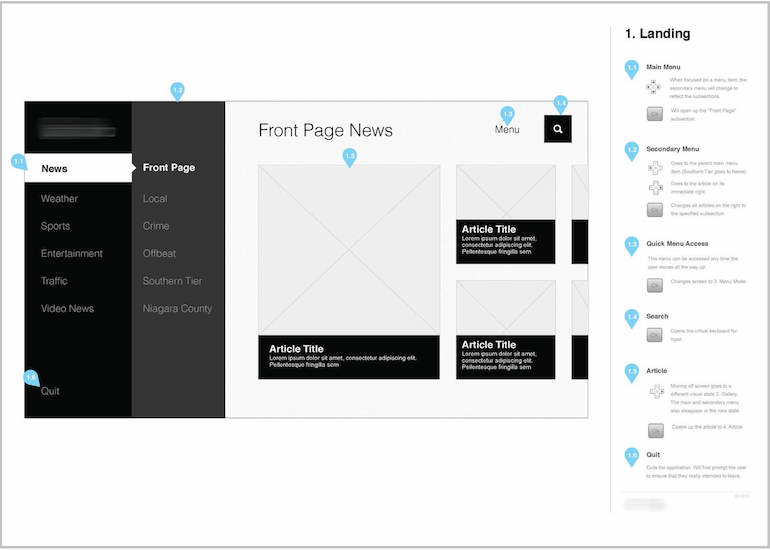
- Ask for feedback in the context of the design. Feedback that’s specific to the design should be collected directly within the prototyping tool. Tools like Figma and InVision allow you to share design assets with your team and clients, and lets them leave comments for you to review.
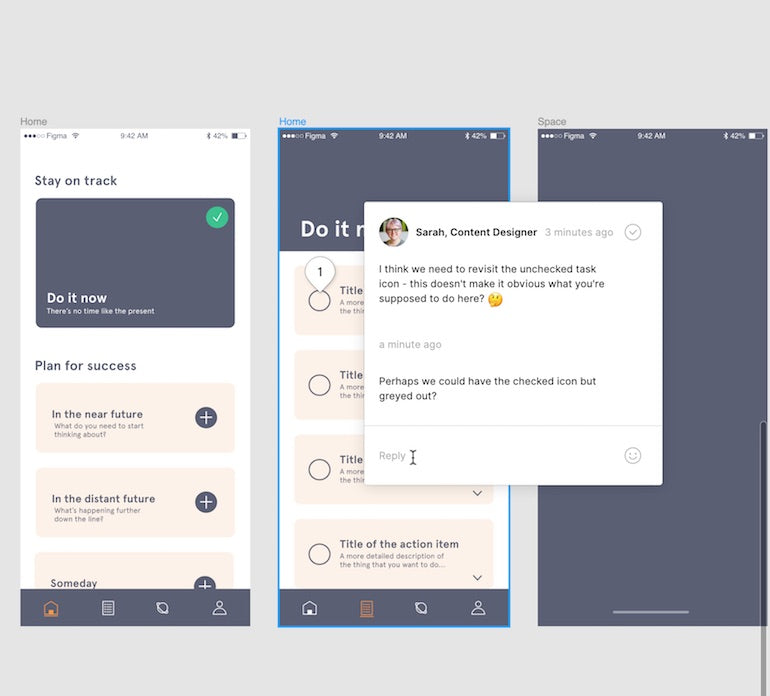
- Use motion to explain interaction patterns. It can be hard to explain animated transitions using static screens. To get around this, create your prototype and record a video walkthrough to make sure that the dynamic design is well understood by all stakeholders.
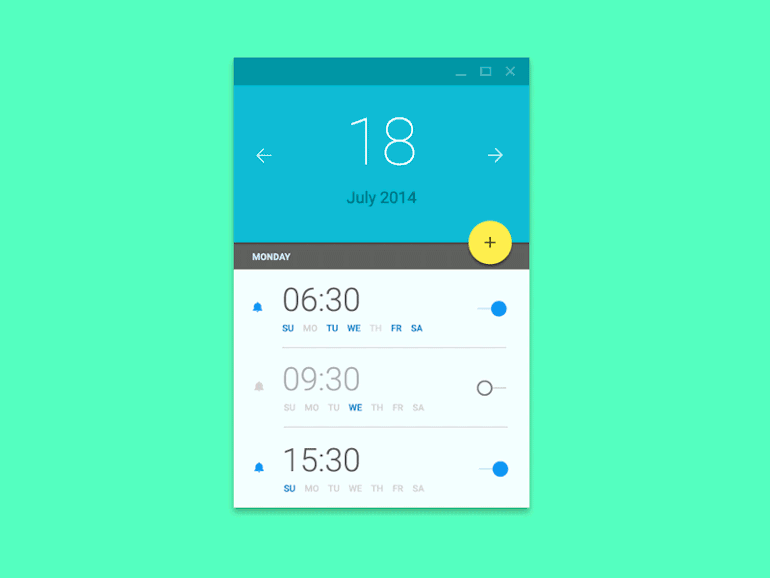
Set up task and project management software
Task management or project management tools are essential for tracking progress of a product or design, especially when working remotely. Some popular options are:
You might also like: 7 Essential Digital Project Management Best Practices.
You need to find a task management tool that is convenient for everyone and reflects your team’s work style.
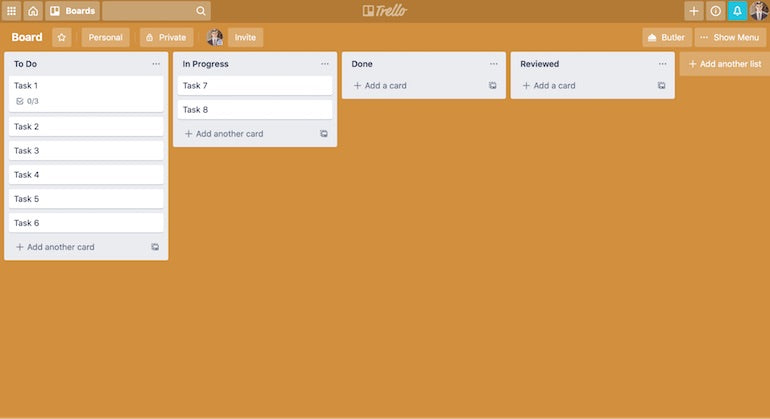
Incorporate messaging systems
Team messaging systems like Slack are good for posting product updates and questions. For each project you work on, create two channels— one for your team to communicate internally (i.e., #acmeproject-ourteam), and the other for talking directly with the client (i.e., #acmeproject-client).
Of course, your client might prefer to invite you into their own messaging app to fit you into their existing workflow. In that case, you could have one internal Slack channel for your team, and use whatever messaging solution your client prefers.
In addition to having project- or topic-specific channels, don’t forget about #random and #design-feedback channels. The first channel can be used for sharing interesting trivia or moments from personal life, creating a virtual “water cooler”-type environment that’s missing when you work remotely. The second channel is suitable for requesting feedback on anything you’re currently working on.
It’s also worth mentioning that Slack allows you to get real-time updates about important changes to prototypes, like comments.
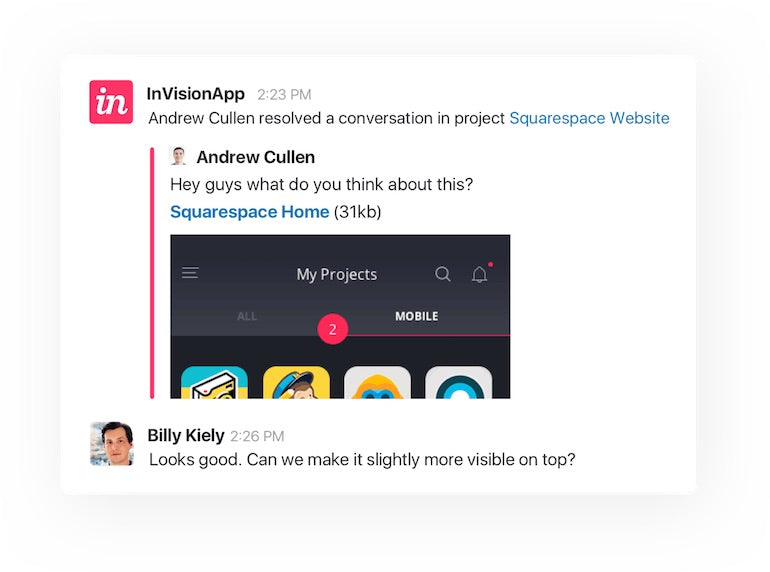
Schedule video calls
When designers provide feedback on a design, they usually do it in the form of text comments. While that feedback can give enough details for the other person to get a sense of what you mean, you still miss an opportunity to convey facial expressions, tone of voice, and instantaneous emotional reactions. These can say far more than typed words.
Remember, up to 90 percent of all communication is nonverbal. For that reason, important, complicated, or controversial feedback should be communicated through video and voice chat instead of just text. Google Hangouts, Zoom, and Skype allow you to have video calls while sharing your screens to collaborate on your design.
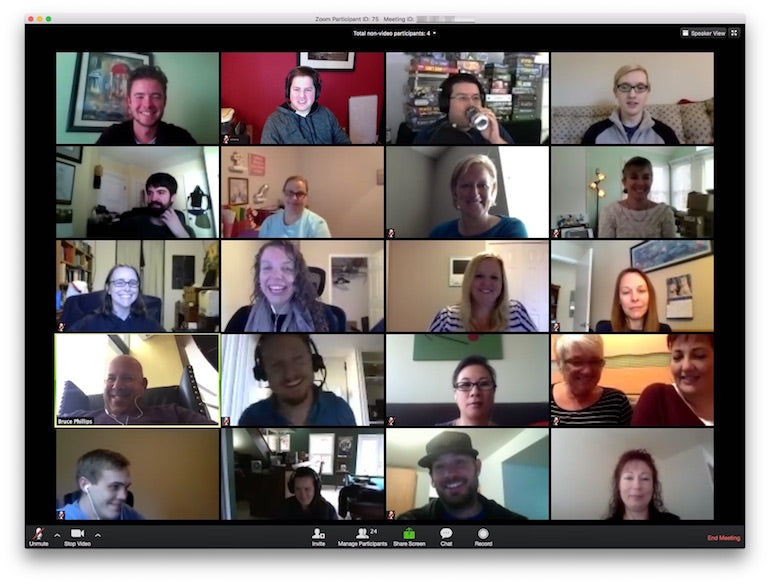
Use virtual whiteboards
One of the most powerful feelings that remote team members can have is the feeling of creating a design together using a whiteboard. Most in-person brainstorming sessions happen near a whiteboard because it allows designers to explore possibilities together in real-time, and also to share their energy.
You might also like: 22 Basic UX Laws That Every Designer Should Know.
Doing remote design is a challenge because you can’t just draw something on a physical whiteboard so everyone can see it. Thankfully, modern tools allow you to replicate this approach online. Mural and Miro are great online whiteboards that are designed for better team collaboration. By using these tools, it’s easy to map out a user journey and get everybody on the same page.
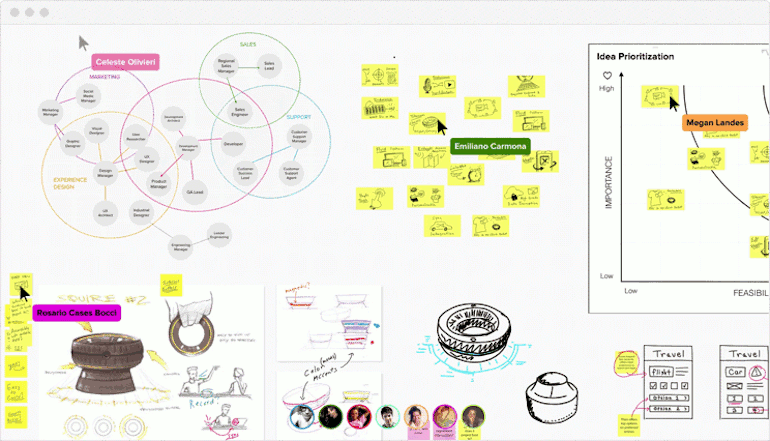
Set up cloud-based file storage solutions with version control
“Where can I find the latest version of the design?” This is a typical question among many design teams. When designers work on a project, they usually share large design assets with other team members, and quite often, it’s hard to tell which is the most current version.
When it comes to remote management and the design process, it’s not only important to share the file with multiple people, but also to ensure that everyone has access to the most up-to-date iteration. Tools like Abstract or Sympli will help you achieve this goal by providing version control and the ability to see change history.
"It’s not only important to share the file with multiple people, but also to ensure that everyone has access to the most up-to-date iteration."
If you are working on text documents or spreadsheets, Google Docs is an easy and simple solution with the same features.
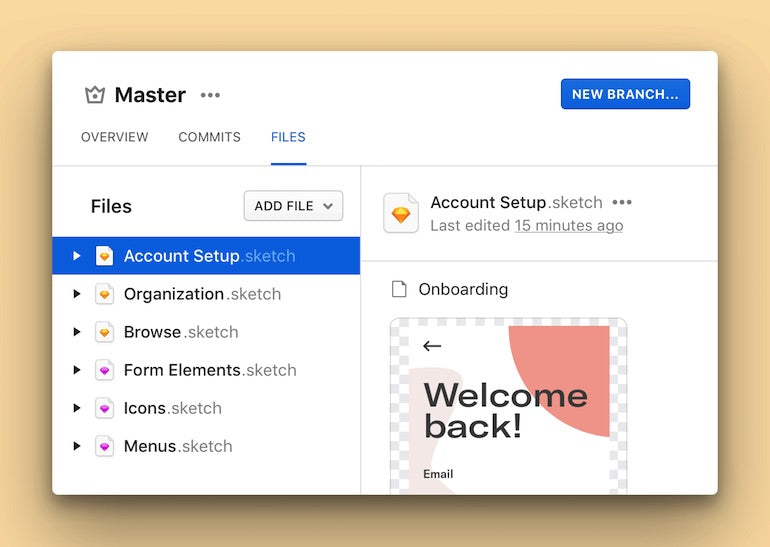
Mastering remote management and collaboration in UX design
Effective organization of remote work is a sign of the maturity of an organization, and the professionalism of a manager. The number of remote workers will only rise given the current state of the world. By establishing the proper tools, processes, and procedures that support remote management, you’ll not only set up your organization for success, but potentially the rest of your career as a design manager.
COVID-19 Response for Shopify Partners
Solidarity and community bring us together. Learn how you can stay connected to the Shopify Partner ecosystem, adjust to these complicated times, and help your clients and users along the way.
Read moreRead more
- How to Write Excellent Commerce Content for Your Clients
- How to Use a Mind Map in Product Design
- Should Your Agency Adopt an Agile Process?
- How to Write a Product Roadmap That Works
- A Step-by-Step Guide on Building Processes to Scale your Development Agency
- Leading Successful Discovery Sessions: Set the Stage for Client Projects

